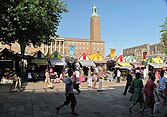
Back بوابة:رأسمالية Arabic Portail:Capitalisme French Portal:Capitalismo Portuguese Portal:Capitalism Romanian Портал:Капитализм Russian ද්වාරය:ධනවාදය Singhalese
The Capitalism PortalCapitalism is an economic system based on the private ownership of the means of production and their operation for profit. The defining characteristics of capitalism include capital accumulation, competitive markets, price systems, private property, recognition of property rights, self-interest, economic freedom, meritocracy, work ethic, consumer sovereignty, economic efficiency, limited role of government, profit motive, a financial infrastructure of money and investment that makes possible credit and debt, entrepreneurship, commodification, voluntary exchange, wage labor, production of commodities and services, and a strong emphasis on innovation and economic growth. In a market economy, decision-making and investments are determined by owners of wealth, property, or ability to maneuver capital or production ability in capital and financial markets—whereas prices and the distribution of goods and services are mainly determined by competition in goods and services markets. Economists, historians, political economists, and sociologists have adopted different perspectives in their analyses of capitalism and have recognized various forms of it in practice. These include laissez-faire or free-market capitalism, anarcho-capitalism, state capitalism, and welfare capitalism. Different forms of capitalism feature varying degrees of free markets, public ownership, obstacles to free competition, and state-sanctioned social policies. The degree of competition in markets and the role of intervention and regulation, as well as the scope of state ownership, vary across different models of capitalism. The extent to which different markets are free and the rules defining private property are matters of politics and policy. Most of the existing capitalist economies are mixed economies that combine elements of free markets with state intervention and in some cases economic planning. Capitalism in its modern form emerged from agrarianism in England, as well as mercantilist practices by European countries between the 16th and 18th centuries. The Industrial Revolution of the 18th century established capitalism as a dominant mode of production, characterized by factory work and a complex division of labor. Through the process of globalization, capitalism spread across the world in the 19th and 20th centuries, especially before World War I and after the end of the Cold War. During the 19th century, capitalism was largely unregulated by the state, but became more regulated in the post–World War II period through Keynesianism, followed by a return of more unregulated capitalism starting in the 1980s through neoliberalism. The existence of market economies has been observed under many forms of government and across a vast array of historical periods, geographical locations, and cultural contexts. The modern industrial capitalist societies that exist today developed in Western Europe as a result of the Industrial Revolution. The accumulation of capital is the primary mechanism through which capitalist economies promote economic growth. However, it is a characteristic of such economies that they experience a business cycle of economic growth followed by recession.s. (Full article...) Selected article
Norwich Market (also known as Norwich Provision Market) is an outdoor market consisting of around 200 stalls in central Norwich, England. Founded in the latter part of the 11th century to supply Norman merchants and settlers moving to the area following the Norman conquest of England, it replaced an earlier market a short distance away. It has been in operation on the present site for over 900 years.
By the 14th century, Norwich was one of the largest and most prosperous cities in England, and Norwich Market was a major trading hub. Control of, and income from, the market was ceded by the monarchy to the city of Norwich in 1341, from which time it provided a significant source of income for the local council. Freed from royal control, the market was reorganised to benefit the city as much as possible. Norwich and the surrounding region were devastated by plague and famine in the latter half of the 14th century, with the population falling by over 50%. Following the plague years, Norwich came under the control of local merchants and the economy was rebuilt. In the early 15th century, a Guildhall was built next to the market to serve as a centre for local government and law enforcement. The largest surviving mediaeval civic building in Britain outside London, it remained the seat of local government until 1938 and in use as a law court until 1985. (Full article...) Selected biography
Ludwig Heinrich Edler von Mises (German: [ˈluːtvɪç fɔn ˈmiːzəs]; 29 September 1881 – 10 October 1973) was a philosopher, Austrian School economist, sociologist, and classical liberal. Mises wrote and lectured extensively on behalf of classical liberalism. He became a prominent figure in the Austrian School of economic thought and is best known for his work on praxeology, a study of human choice and action. Fearing a Nazi takeover of Switzerland, where he was living at the time, Mises emigrated to the United States in 1940. Mises' thought has exerted significant influence on the libertarian movement in the United States since the mid-20th century. The Ludwig von Mises Institute was founded in the United States to continue his teachings. (Full article...)
Selected quote
General imagesThe following are images from various capitalism-related articles on Wikipedia.
Did you know
CategoriesRelated portalsCapitalism topicsCapitalism .. Private property .. Economic freedom .. Laissez-faire .. British Agricultural Revolution .. Industrial Revolution .. Klondike Gold Rush .. Marketplace .. Money .. Wage .. Taxes .. Patent .. Capitalist mode of production .. Criticisms of socialism .. Corporate capitalism .. Democratic capitalism .. Anarcho-capitalism .. State capitalism .. Welfare capitalism .. Adam Smith .. Milton Friedman .. Ludwig Von Mises .. Murray N. Rothbard .. The Wealth of Nations .. The Protestant Ethic and the Spirit of Capitalism .. Capital and Interest .. Capitalism and Freedom .. American capitalism .. Ronald Reagan Things you can do Improve this portal! Associated WikimediaThe following Wikimedia Foundation sister projects provide more on this subject:
Discover Wikipedia using portals |
© MMXXIII Rich X Search. We shall prevail. All rights reserved. Rich X Search















































